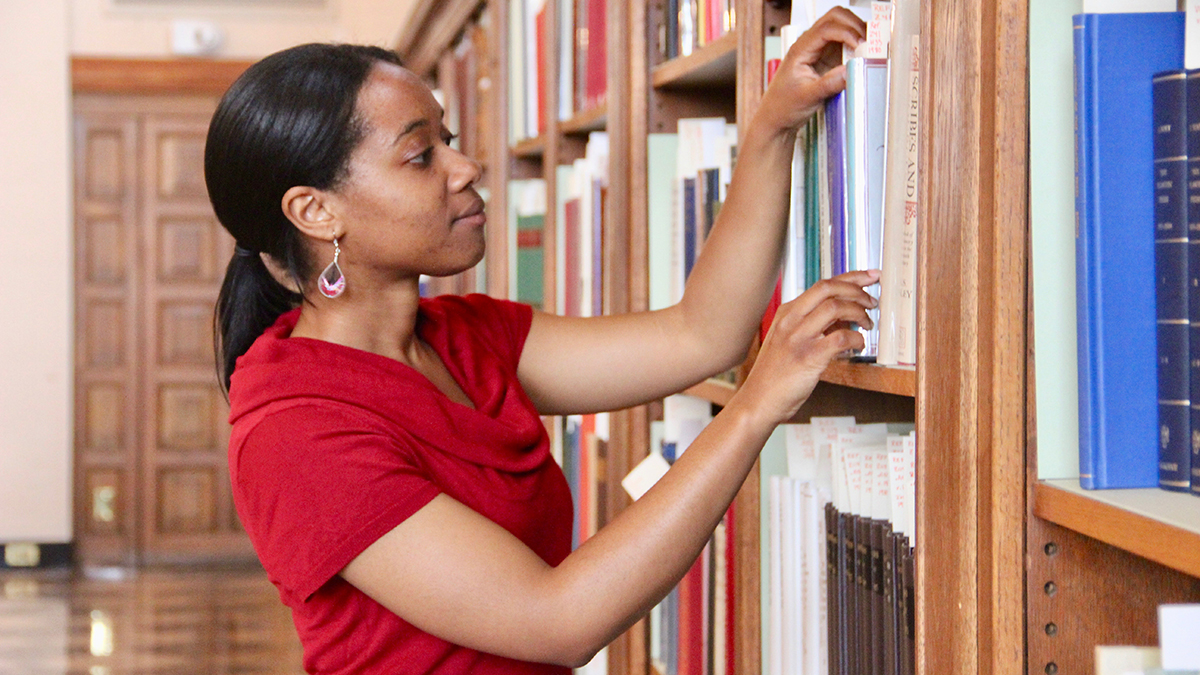Scared of libraries? This graduate can help.
Nadia Clifton, a Carolina student who will graduate with a Master of Science in Library Studies this weekend, is working to make sure everyone has the tools and confidence they need to access information from any era, and on any subject.

Thirty-some years ago, a researcher named Constance A. Mellon discovered that college students were suffering from a bizarre affliction: library anxiety.
You might not find it on WebMD, but library anxiety is a real thing — so real that you’d be hard pressed to find a university librarian who isn’t talking about it. And according to scientific journals, most of us have experienced it.
“For a lot of people, libraries are intimidating,” said Nadia Clifton, a Carolina student who will graduate with a Master of Science in Library Science this weekend at Kenan Stadium. “It’s ‘Where do I go? Can I be in here? Can I not?’ I want people to know that they’re welcome in this space.”
Clifton, a research assistant in Wilson Library’s rare book collection, understands why students often feel overwhelmed. It’s just not that easy to navigate.
Before she moves on from Carolina, she wanted to try and change that.
So, Clifton came up with a plan to make Wilson Library — her own “home base” throughout her graduate studies — a little more accessible for everyone.
“I thought if you could explore the space online before you get there, you might know where you’re supposed to be, so it may help with removing some of those barriers,” she said. “So, one of my class projects is making a 360-degree virtual tour of the space.”
By stitching together panoramic photos with computer software, Clifton’s project enables students to “visit” the library online at any time. The project will also help people with disabilities identify accessible entrances, automatic doors and elevators.
“The project came out of a class about disability informatics, but I hope it will be useful for everybody, including people who have a lot of anxiety about being in new places,” she said. “I want people to feel comfortable in the space before they even get there.”
If visitors can overcome their apprehension of the library, they’ll get to see Clifton’s own curated exhibit this summer featuring literature, religious texts, medical documents and other rare reading materials from the 1400s to the 1700s.
Elizabeth Ott, the Frank Borden Hanes Curator of Rare Books at UNC Libraries, said the exhibit will be well worth a visit.
“Books are more than the texts they contain — they bear witness to the cultures that created them and the individual people who owned them,” Ott said. “Nadia arrived at UNC Libraries with already a considerable abundance of expertise, sensitivity and insight into the use and value of rare books, and I feel lucky to have had the opportunity to work alongside her. She is very committed to promoting the resources of special collections to all audiences.”
While rare books are among the materials that library visitors are most afraid to handle, Clifton said, they offer a window into our shared humanity with the generations that came before.
“We kind of look at rare books and think, ‘Oh, we can’t touch those.’ They are old and valuable, but you can find things in them like writing in the margins, fun doodles or family recipes written down [by early modern readers]. You realize that they were people too,” she said.
In other words, it’s not that scary after all.
As Clifton prepares to graduate, the virtual tour project and her new exhibit set the stage for a career in library instruction and outreach. She plans to continue working in academic libraries, making sure everyone has the tools and confidence they need to access information from any era, and on any subject.
“To see the people at UNC doing such amazing things to make people feel comfortable [exploring the libraries] — it’s really great,” she said. “A lot of things have been digitized, and that’s great for remote access. But when you have the work in your hand, you see the physicality of it, and you get something out of it that you don’t get from the screen. Everybody should be able to have that experience if they want to.”




